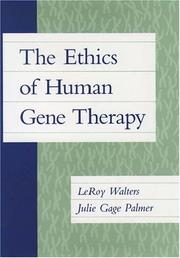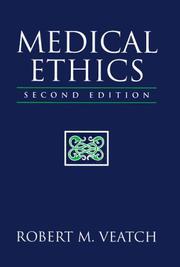| Listing 1 - 3 of 3 |
Sort by
|

ISBN: 0195059557 9780195059557 Year: 1997 Publisher: New York Oxford university press
Abstract | Keywords | Export | Availability | Bookmark
 Loading...
Loading...Choose an application
- Reference Manager
- EndNote
- RefWorks (Direct export to RefWorks)
The authors of this absorbing new book describe the science of gene therapy in terms easily accessible to the non-specialist, and focus on the controversial ethical and public policy issues surrounding human interventions in human heredity. After a brief survey of the structure and functions of DNA, genes, and cells, Walters and Palmer discuss three major types of potential genetic intervention: somatic cell gene therapy, germ line gene therapy, and genetic enhancements. They start with the current techniques of gene addition, using non-reproductive (somatic) cells in an effort to cure or treat disease. Next they address the technical problems and moral issues facing attempts to prevent disease through genetically modifying early human embryos or sperm and egg cells. These changes would be passed on to future generations. Chapter 4, in many ways the most original part of this volume, confronts the issue of employing genetic means to improve human abilities and appearance. Depending on the technique, such enhancements could affect not only the individuals receiving the intervention but their offspring as well. Three types of genetic enhancements are considered: physical alterations to improve size, reduce the need for sleep, and decelerate aging; intellectual enhancements of memory and general cognitive ability; and moral enhancements for control of violently aggressive behavior. The authors maintain that genetic modifications should be evaluated individually rather than be condemned in principle or as a group. The final chapter summarizes the public review process that human gene therapy proposals have been undergoing in the United States since 1990. Five appendices, providing technical background information along with a complete list of questions raised in the national public review process, supplement the discussion.
Professional ethics. Deontology --- Human medicine --- #GBIB:CBMER --- gentherapie --- verbetergeneeskunde (mensverbetering) --- genetische engineering (manipulatie, gentechnologie) --- somatische gentherapie --- kiemcel (kiemcellijn, embryonale kiemcel, germinale stamcel) --- thérapie génique --- médecine de l'amélioration (médecine d'amélioration) --- génie génétique (ingénierie, manipulation génétique) --- thérapie génique somatique --- cellule germinale (lignée germinale, cellule embryonnaire germinale, cellule souche germinale) --- Gene therapy --- Moral and ethical aspects. --- Moral and ethical aspects --- Therapy, Gene --- Genetic engineering --- Therapeutics --- Gene therapy - Moral and ethical aspects


ISBN: 0867209747 Year: 1997 Publisher: Boston Jones and Bartlett
Abstract | Keywords | Export | Availability | Bookmark
 Loading...
Loading...Choose an application
- Reference Manager
- EndNote
- RefWorks (Direct export to RefWorks)
Fourteen leading authorities in their respective fields provide the most comprehensive and current survey of issues in medical ethics ever written. Each author is given the opportunity to write a chapter surveying a critical issue in one of the major subject areas in medical ethics. Within each chapter, the author develops a discussion of the critical concepts, arguments and positions in a particular facet of medical ethics, without arguing for one position or another. Since the first edition of Medical Ethics in 1989, important changes have occurred that affect every chapter in this book. To address these changes, Robert Veatch has asked the original contributors to address the developments of the past six years. Additionally, Ronald Bayer has contributed an new chapter on AIDS and ethics. Norman Daniels, former member of the ethics advisory group for President Clinton's Health Care Task Force, provides a framework for understanding the ethical dimension of the health care policy debate.


ISBN: 0878406468 Year: 1997 Publisher: Washington Georgetown university press
Abstract | Keywords | Export | Availability | Bookmark
 Loading...
Loading...Choose an application
- Reference Manager
- EndNote
- RefWorks (Direct export to RefWorks)
"Evangelium Vitae", or "The Gospel of Life", Pope John Paul II's 1995 encyclical, addresses practical moral questions that touch on the sacredness of human life: abortion, euthanasia and assisted suicide, and capital punishment. Tackling major moral and cultural ideas, the Pope urged "all men and women of good will" to embrace a "culture of life" instead of the prevailing "culture of death". In this book, scholars from a wide range of disciplines - law, medicine, philosophy, and theology - and various religious perspectives discuss and interpret the Pope's teachings on these complex moral issues. The opening essays establish a context for the encyclical in the moral thought of John Paul II and examine issues of methodology and ecclesiology. A second group considers the themes of law and technology, which are crucial to the way the encyclical views the specific matters of life and death. The final section turns to the specific topics of abortion, euthanasia, assisted suicide, medical experimentation, and capital punishment. Seeking to promote discussion between the ideas of the encyclical and other points of view, this volume does not attempt to endorse "Evangelium Vitae" but rather to illustrate its relevance to both private choice and public policy. It will serve as a foundation for further dialogue and allow others to approach the pontiff's thought with new awareness and insight.
Abortion --- Capital punishment --- Euthanasia --- Religious aspects --- Catholic Church --- Religious aspects --- Catholic Church --- Religious aspects --- Catholic Church --- Catholic Church. --- Catholic Church --- Doctrines.
| Listing 1 - 3 of 3 |
Sort by
|

 Search
Search Feedback
Feedback About UniCat
About UniCat  Help
Help News
News